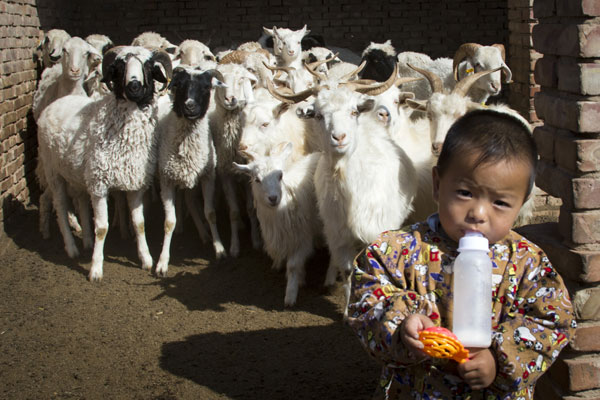Ningxia residents begin the long climb out of poverty
Updated: 2012-12-19 08:37
By Peng Yining (China Daily)
|
|||||||||||
However, the locals and the government are looking for a more sustainable means of poverty relief than charity can provide.
In common with many rural residents on Ningxia's Loess plateau, Zhang's family lives in caves excavated by their forebears a century ago. The two 20-square-meter caves are used as bedrooms, a living room and kitchen.
The walls are blackened by smoke from the cooking fire, and as only one side will allow a window, the caves resemble two hollowed-out eye sockets when viewed from a distance.
According to a 2012 report from the Ningxia Poverty Alleviation and Development Office, water scarcity has seriously restricted the development of this mountainous area. The population is eight times larger than the environment's capacity, meaning the imbalance between humans and available resources makes the poverty even more grinding.
 |
|
Zou Xiaomei's young son drinks milk in the family sheepfold in Tongxin county. Zou used to work in Yinchuan, but returned home to breed livestock after she secured loans from a microfinancing service. |
A short rainy season in summer brings once-a-year rainfall to the dry, infertile soil, and provides the only source of water for people's cisterns. However, as it washes down the hill, the water carries dirt, leaves and other waste along with it.
Sugar and tea are such luxuries here that they are only offered to guests. They help disguise the taste of dirt in the boiled rainwater. Even after Zhang has settled and filtered the turbid water for a couple of days, you can still feel the sand and grit in the water, between your teeth.
"The griddle doesn't work well, because the sand has blocked most of the holes," explained Zhang Weifan, the family's youngest daughter. The 14-year-old said she couldn't remember the last time she took a bath or brushed her teeth. The family receives donations from the local government and charity organizations of, at most, a little more than 2,000 yuan every year. But the money doesn't help in the long term, said Zhang Yanqin. Her four children, aged 12 to 18, need more than 20,000 yuan a year and medical expenses for her elderly parents-in-law are also a heavy burden.
"Even a bowl of beef noodles costs 10 yuan," she said.
Zhang Yanqin and her husband are illiterate and have no skills that will enable them to find work outside their village.
Related Stories
A Ningxia journey 2012-12-18 17:44
Ningxia blazing a trail in opening of inland regions 2012-12-08 11:07
Slide: An autumn trip to Ningxia 2012-09-19 15:24
Central SOEs ink co-op deals with Ningxia 2012-07-21 14:02
Ningxia tests answer to chronic water shortage 2012-07-17 10:41
Today's Top News
President Xi confident in recovery from quake
H7N9 update: 104 cases, 21 deaths
Telecom workers restore links
Coal mine blast kills 18 in Jilin
Intl scholarship puts China on the map
More bird flu patients discharged
Gold loses sheen, but still a safe bet
US 'turns blind eye to human rights'
Hot Topics
Lunar probe , China growth forecasts, Emission rules get tougher, China seen through 'colored lens', International board,
Editor's Picks

|

|

|

|

|

|





